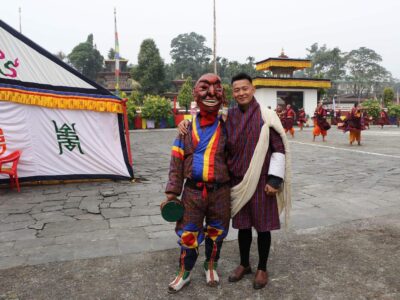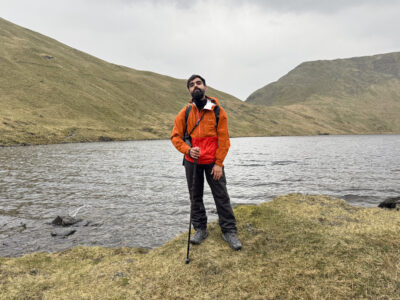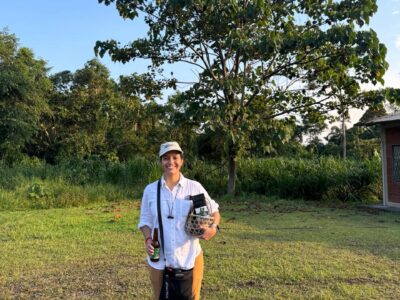As a NASCAR racecar-engineer and crew-chief Josh Browne’s work clothes included fire-retardant suits and a two-way radio headset. Today, a decade after he started with NASCAR, Josh is a student in the 12-month Master of Arts Program in Climate and Society (C and S) and dresses accordingly.
Despite his fascination with racecars, Josh was an early adopter of environmental thinking and in 2010, decided to reconnect with his environmental interests by enrolling in the Climate and Society program. As an undergraduate at Carnegie Mellon, Josh double-majored in mechanical engineering and the environmentally focused Engineering Public Policy program. After graduation, he took a job with Chrysler Corporation in Detroit, planning to focus on emissions and alternative-energy engineering. However, the SUV and minivan boom of the 1990s cut off these options so instead he got involved in what was then a fairly new design/development method in the automobile industry: computer-aided engineering. Studying for a master’s degree in mechanical engineering at Oakland University while working at Chrysler, Josh’s focus changed to vehicle dynamics simulation and that led to the racetrack.
Despite his passion for the racing world, Josh never lost interest in environmental issues. At the end of 2009, he decided to leave his “fossil-fuel-burning career” and go back to school to study climate and environmental issues. When it came to the search for the right graduate school, Josh felt that there was nowhere else that offered the interdisciplinary options within the field of climate that existed at Columbia Climate and Society program. “I didn’t want to be in a completely technical program, and I wanted to be able to collaborate with non-engineering students. The Climate and Society program allows me to take technical courses, while maintaining the core focus on earth dynamics and climate change. In just my first semester, I have had classes taught by the likes of Klaus Lackner, Vijay Modi, Tony Barnston, and Mark Cane. This kind of experience is a benefit of this program, and obviously one of the unique advantages of Columbia University.”
Housed in the Department of Earth and Environmental Sciences within Columbia’s Graduate School of Arts and Sciences (GSAS), the Climate and Society program shares its name and as well as its mission with the International Research Institute for Climate and Society (IRI), a research unit of the Earth Institute. Josh’s core coursework is a set of tailor-made courses providing a scientific basis for inquiry that stresses interdisciplinary problem solving. The core consists of dynamics of climate variability and change, regional climate and climate impacts, quantitative models of climate-sensitive natural and human systems, and the integrative policy course titled managing and adapting to climate variability and change. A professional development seminar and a choice between a summer internship and research thesis complete the required core.
According to Josh, “I really like the core dynamics class taught by Lisa Goddard and Mark Cane. It is a crash course in earth systems and climate modeling. But the quantitative-models class taught by Mingfang Ting and Tony Barnston is probably my favorite course so far. It is an intense course, focusing on how climate data can be used in decision making.“
Apart from the core courses, students in the program are able to tailor the curriculum through the choice of five electives over the course of the fall and spring semesters. These electives can be chosen from the many departments that make up GSAS including Anthropology; Sociology; and the Department of Ecology, Evolution and Environmental Biology. Furthermore, students can choose electives from within the many other graduate schools at Columbia including the Mailman School of Public Health; the School of International and Public Affairs; the Law School; the School of Architecture, Planning and Preservation; and the Business School.
In addition to the interdisciplinary curriculum, Josh also values the diversity of the students in the program and how close-knit all the classmates have become. “I don’t know many other programs where students with degrees in Africana-studies, poetry, chemistry and mechanical engineering can work on climate projects together.”



